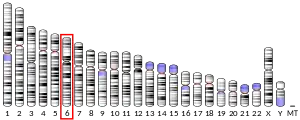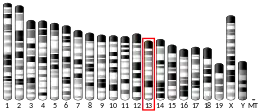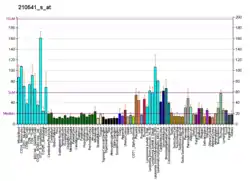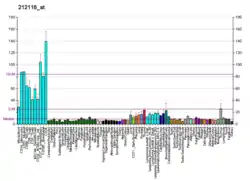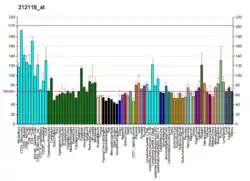TRIM27
Zinc finger protein RFP is a protein that in humans is encoded by the TRIM27 gene.[5][6]
This gene encodes a member of the tripartite motif (TRIM) family. The TRIM motif includes three zinc-binding domains, a RING, a B-box type 1 and a B-box type 2, and a coiled-coil region. This protein localizes to the nuclear matrix. It interacts with the enhancer of polycomb protein and represses gene transcription. It is also thought to be involved in the differentiation of male germ cells. Fusion of the N-terminus of this protein with the truncated C-terminus of the RET gene product has been shown to result in production of the ret transforming protein.[6]
References
- ENSG00000233948, ENSG00000204713, ENSG00000215641, ENSG00000237071, ENSG00000237462, ENSG00000234495 GRCh38: Ensembl release 89: ENSG00000229006, ENSG00000233948, ENSG00000204713, ENSG00000215641, ENSG00000237071, ENSG00000237462, ENSG00000234495 - Ensembl, May 2017
- GRCm38: Ensembl release 89: ENSMUSG00000021326 - Ensembl, May 2017
- "Human PubMed Reference:". National Center for Biotechnology Information, U.S. National Library of Medicine.
- "Mouse PubMed Reference:". National Center for Biotechnology Information, U.S. National Library of Medicine.
- Vernet C, Boretto J, Mattei MG, Takahashi M, Jack LJ, Mather IH, Rouquier S, Pontarotti P (Mar 1994). "Evolutionary study of multigenic families mapping close to the human MHC class I region". J Mol Evol. 37 (6): 600–12. Bibcode:1993JMolE..37..600V. doi:10.1007/bf00182746. PMID 8114113. S2CID 19054302.
- "Entrez Gene: TRIM27 tripartite motif-containing 27".
- Cao, T; Duprez E; Borden K L; Freemont P S; Etkin L D (May 1998). "Ret finger protein is a normal component of PML nuclear bodies and interacts directly with PML". J. Cell Sci. ENGLAND. 111 (10): 1319–29. doi:10.1242/jcs.111.10.1319. ISSN 0021-9533. PMID 9570750.
- Morris-Desbois, C; Bochard V; Reynaud C; Jalinot P (Oct 1999). "Interaction between the Ret finger protein and the Int-6 gene product and co-localisation into nuclear bodies". J. Cell Sci. ENGLAND. 112 (19): 3331–42. doi:10.1242/jcs.112.19.3331. ISSN 0021-9533. PMID 10504338.
Further reading
- Borden KL (1999). "RING fingers and B-boxes: zinc-binding protein-protein interaction domains". Biochem. Cell Biol. 76 (2–3): 351–8. doi:10.1139/bcb-76-2-3-351. PMID 9923704.
- Isomura T, Tamiya-Koizumi K, Suzuki M, et al. (1992). "RFP is a DNA binding protein associated with the nuclear matrix". Nucleic Acids Res. 20 (20): 5305–10. doi:10.1093/nar/20.20.5305. PMC 334335. PMID 1437549.
- Ishizaka Y, Ochiai M, Tahira T, et al. (1989). "Activation of the ret-II oncogene without a sequence encoding a transmembrane domain and transforming activity of two ret-II oncogene products differing in carboxy-termini due to alternative splicing". Oncogene. 4 (6): 789–94. PMID 2734021.
- Takahashi M, Cooper GM (1987). "ret transforming gene encodes a fusion protein homologous to tyrosine kinases". Mol. Cell. Biol. 7 (4): 1378–85. doi:10.1128/mcb.7.4.1378. PMC 365224. PMID 3037315.
- Takahashi M, Buma Y, Iwamoto T, et al. (1990). "Cloning and expression of the ret proto-oncogene encoding a tyrosine kinase with two potential transmembrane domains". Oncogene. 3 (5): 571–8. PMID 3078962.
- Takahashi M, Inaguma Y, Hiai H, Hirose F (1988). "Developmentally regulated expression of a human "finger"-containing gene encoded by the 5' half of the ret transforming gene". Mol. Cell. Biol. 8 (4): 1853–6. doi:10.1128/mcb.8.4.1853. PMC 363354. PMID 3380101.
- Cao T, Borden KL, Freemont PS, Etkin LD (1997). "Involvement of the rfp tripartite motif in protein-protein interactions and subcellular distribution". J. Cell Sci. 110 (14): 1563–71. doi:10.1242/jcs.110.14.1563. PMID 9247190.
- Cao T, Duprez E, Borden KL, et al. (1998). "Ret finger protein is a normal component of PML nuclear bodies and interacts directly with PML". J. Cell Sci. 111 (10): 1319–29. doi:10.1242/jcs.111.10.1319. PMID 9570750.
- Morris-Desbois C, Bochard V, Reynaud C, Jalinot P (1999). "Interaction between the Ret finger protein and the Int-6 gene product and co-localisation into nuclear bodies". J. Cell Sci. 112 (19): 3331–42. doi:10.1242/jcs.112.19.3331. PMID 10504338.
- Shimono Y, Murakami H, Hasegawa Y, Takahashi M (2001). "RET finger protein is a transcriptional repressor and interacts with enhancer of polycomb that has dual transcriptional functions". J. Biol. Chem. 275 (50): 39411–9. doi:10.1074/jbc.M006585200. PMID 10976108.
- Reymond A, Meroni G, Fantozzi A, et al. (2001). "The tripartite motif family identifies cell compartments". EMBO J. 20 (9): 2140–51. doi:10.1093/emboj/20.9.2140. PMC 125245. PMID 11331580.
- Tezel G, Nagasaka T, Shimono Y, Takahashi M (2003). "Differential expression of RET finger protein in testicular germ cell tumors". Pathol. Int. 52 (10): 623–7. doi:10.1046/j.1440-1827.2002.01401.x. PMID 12445133. S2CID 20915447.
- Strausberg RL, Feingold EA, Grouse LH, et al. (2003). "Generation and initial analysis of more than 15,000 full-length human and mouse cDNA sequences". Proc. Natl. Acad. Sci. U.S.A. 99 (26): 16899–903. Bibcode:2002PNAS...9916899M. doi:10.1073/pnas.242603899. PMC 139241. PMID 12477932.
- Saenko V, Rogounovitch T, Shimizu-Yoshida Y, et al. (2003). "Novel tumorigenic rearrangement, Delta rfp/ret, in a papillary thyroid carcinoma from externally irradiated patient". Mutat. Res. 527 (1–2): 81–90. doi:10.1016/S0027-5107(03)00056-3. PMID 12787916.
- Dho SH, Kwon KS (2003). "The Ret finger protein induces apoptosis via its RING finger-B box-coiled-coil motif". J. Biol. Chem. 278 (34): 31902–8. doi:10.1074/jbc.M304062200. PMID 12807881.
- Shimono Y, Murakami H, Kawai K, et al. (2004). "Mi-2 beta associates with BRG1 and RET finger protein at the distinct regions with transcriptional activating and repressing abilities". J. Biol. Chem. 278 (51): 51638–45. doi:10.1074/jbc.M309198200. PMID 14530259.
- Mungall AJ, Palmer SA, Sims SK, et al. (2003). "The DNA sequence and analysis of human chromosome 6". Nature. 425 (6960): 805–11. Bibcode:2003Natur.425..805M. doi:10.1038/nature02055. PMID 14574404.
- Gerhard DS, Wagner L, Feingold EA, et al. (2004). "The status, quality, and expansion of the NIH full-length cDNA project: the Mammalian Gene Collection (MGC)". Genome Res. 14 (10B): 2121–7. doi:10.1101/gr.2596504. PMC 528928. PMID 15489334.
This article is issued from Wikipedia. The text is licensed under Creative Commons - Attribution - Sharealike. Additional terms may apply for the media files.
